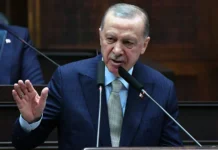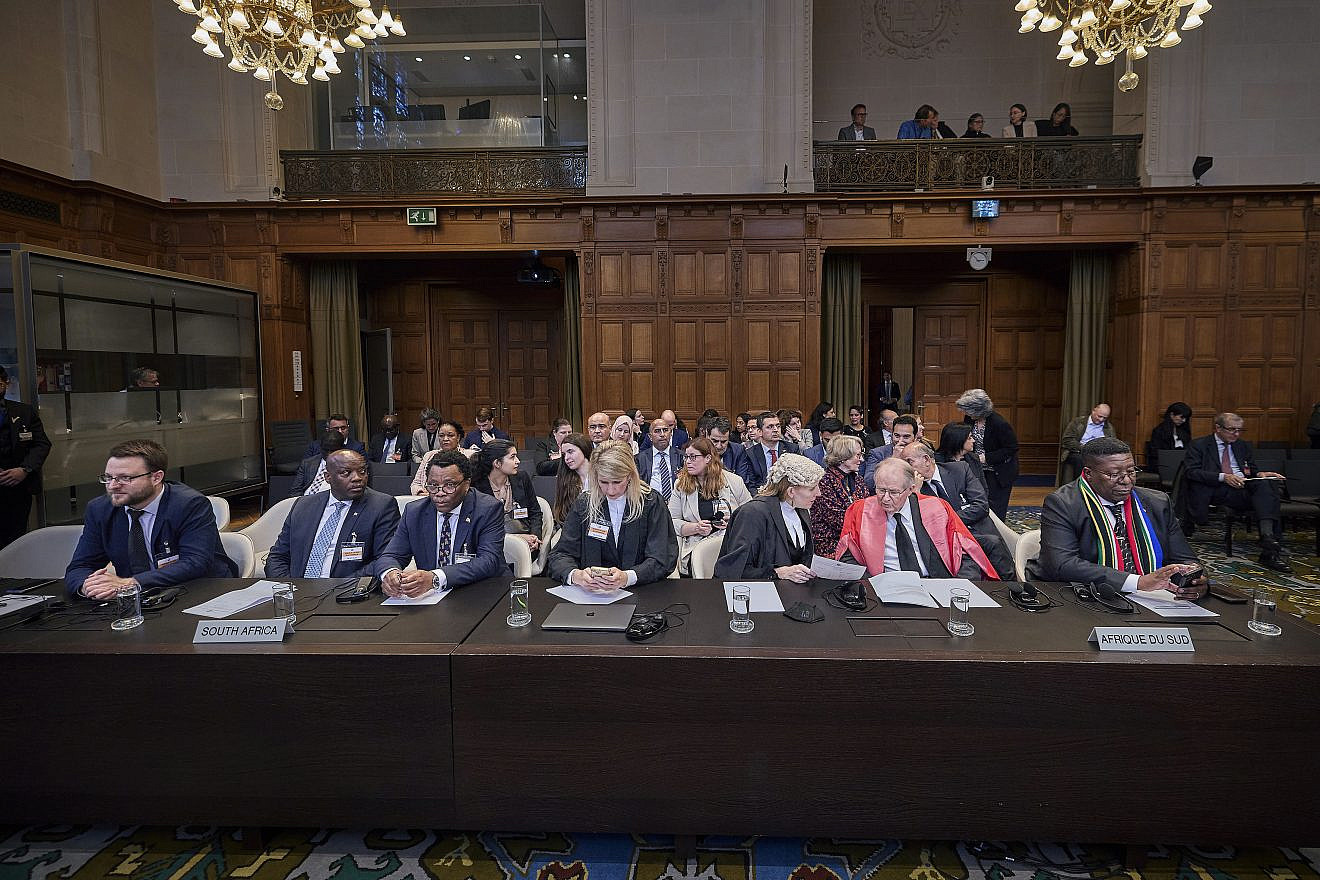Unsurprisingly, the International Court of Justice played along with the cynical attempt by Hamas’s ally South Africa to halt the Israeli military operation launched to destroy the terrorist organization after its horrific Oct. 7 massacre.
Equally unsurprising is that the ICJ justified its ruling by relying on a thin, distorted and inaccurate set of “facts.” In its May 24 ruling, the court relied on a handful of dubious, generalized and misleading claims made by various United Nations figures.
As justice ad hoc Aharon Barak points out:
“The Court relies primarily on statements made by United Nations officials on social media and on press releases issued by relevant organizations (see Order, paragraphs 44-46). It relies on these statements and press releases without even inquiring into what kind of evidence they draw upon. The Court’s approach is in stark contrast with its previous jurisprudence, in which it has stated that ‘United Nations reports [are] reliable evidence only ‘to the extent that they are of probative value and are corroborated, if necessary, by other credible sources.’”
Indeed, as has been pointed out many times before, the United Nations reports on Israel, on which the ICJ relies, are replete with dubious claims and outright lies.
Below are four claims on which the ICJ based its decision, followed by the facts disproving the narrative crafted by the court in an effort to deprive the Jewish state of its right to self-defense.
ICJ Claim 1: “For instance, on 8 May 2024, the Director-General of the World Health Organization stated that the Al Najjar Hospital, one of the last remaining medical facilities in the Rafah Governorate, was no longer functional due to the ongoing hostilities in its vicinity.”
The Facts: Omitted is that Al Najjar Hospital had limited capacity—only 63 beds—which has been more than made up for by the establishment of field hospitals in Rafah Governorate.
For example, there is an International Medical Corps field hospital in al-Mawasi with 140 beds and a Palestinian Red Crescent field hospital with another 50 beds in the Tal as-Sultan area. Israel has also facilitated the establishment of six other field hospitals, many of them located in areas to which those in Rafah have been instructed to evacuate. These include the Jordanian, United Arab Emirates and IMC field hospitals, with a combined capacity of nearly 400 beds in the Khan Yunis and Deir al-Balah areas, as well as several floating hospitals with a combined 168 bed capacity. Several of these were specifically constructed in order to support the evacuations from Rafah.
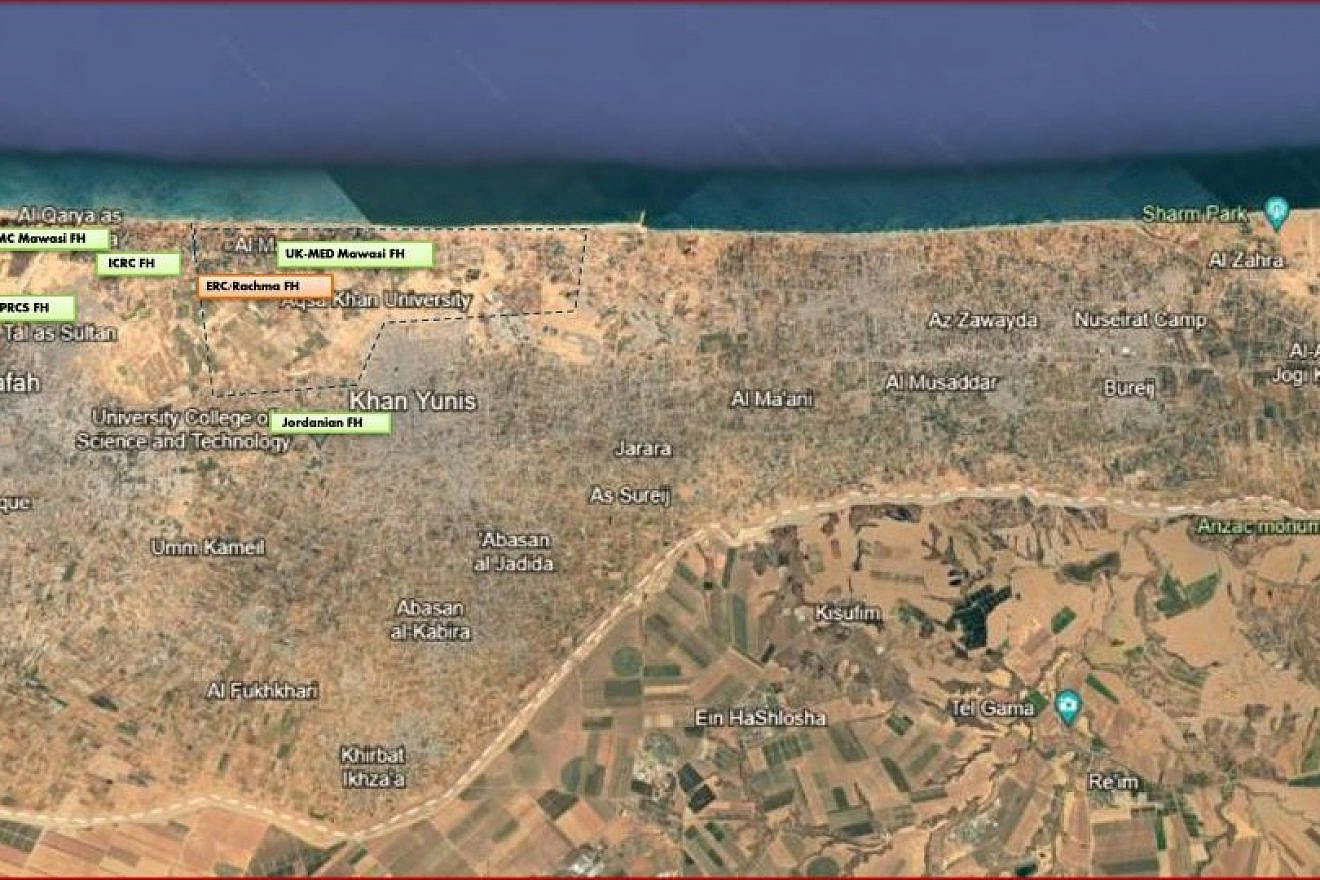
In a manner typical of the rest of the ICJ’s ruling, the responsibility of other parties for the situation is omitted. It is well-established that many of Gaza’s hospitals have been exploited by Palestinian terrorist organizations like Hamas, forcing Israel to attack these medical facilities.
Indeed, it is worth noting that the “ongoing hostilities” in the area of Al Najjar Hospital that the ICJ claims forced the hospital’s closure on May 8 included the barrage of rockets fired from inside Rafah—including the area of Al Najjar Hospital—by Palestinian terrorists just the day before, on May 7.
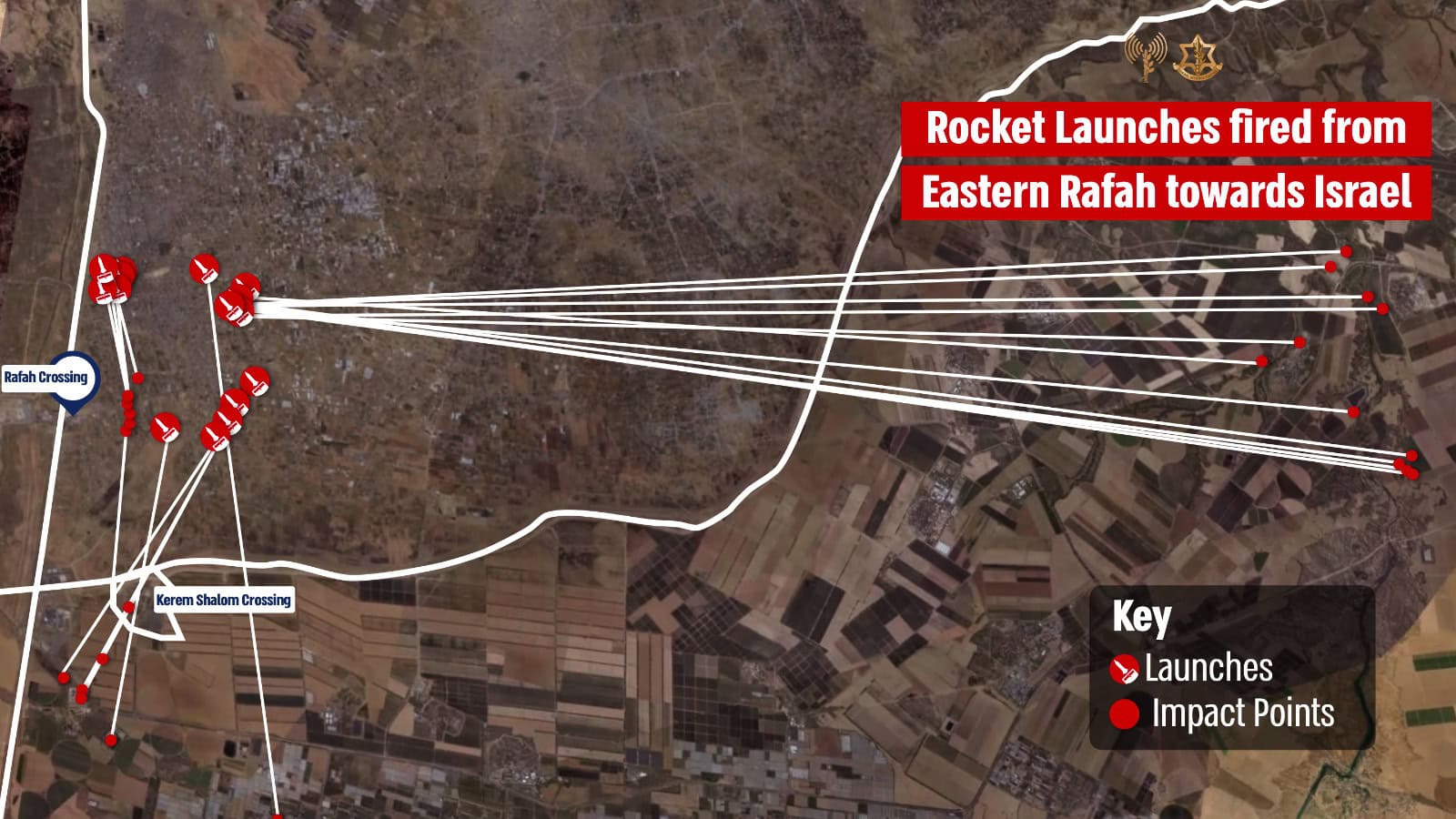
Under the ICJ’s logic, the IDF must stand and take it as Hamas launches rockets from Rafah.
ICJ Claim 2: “On 17 May 2024, the World Food Programme (WFP) warned that it had been unable to access its warehouse in Rafah for over a week and observed that ‘[t]he incursion into Rafah is a significant setback to recent modest progress on access.’”
The Facts: Once again, the ICJ is deceiving the public by omitting the responsibility of parties other than Israel for the situation. Much, if not all, of the responsibility for the aid situation in Rafah lies with Palestinian terrorists, looters and Egypt.
One of the main reasons the WFP has been unable to access its warehouses has little to do with the Israel Defense Forces. In many cases, mobs of Palestinians are stopping aid convoys and looting the supplies destined for WFP warehouses.
Another party responsible for this situation is Egypt. The May 17 WFP report the ICJ cites does indeed claim, “We’ve not been able to access our warehouse in Rafah for more than a week,” but in the very next sentence it goes on to explain: “We have very little food and fuel coming through the border crossings in the south.”
There are two main crossings in the south, both of which have been disrupted by the actions not of Israel, but of Palestinian terrorists and Egypt. The Rafah Crossing, between Gaza and Egypt, was shut down not by Israel but by Egyptian authorities on May 7. As a consequence, much of the food aid meant for Gaza has sat on the Egyptian side of the border with much of it either rotting or being offloaded and sold in Egyptian markets.
The other crossing in the south is the Kerem Shalom Crossing, which has been repeatedly disrupted and shut down due to its deliberate targeting by Palestinian terrorist organizations. Four Israeli soldiers were killed on May 5 by one such barrage.
All of this has occurred while Israeli forces have worked to facilitate the delivery of aid into Gaza. Just yesterday, “50 trucks containing flour for the World Food Program” were transferred through the Kerem Shalom and Erez West crossings. Earlier this week, another 62 trucks containing flour for the WFP were also transferred from the Ashdod Port through the crossings. Last week, 204 trucks of flour were transferred for the WFP through the crossings.
But it’s not just the Egyptians and Palestinians causing these problems. The United Nations itself is demonstrating an inability to do its job in the Gaza Strip. As has been repeatedly documented, hundreds of truckloads of humanitarian aid are consistently left waiting for collection and distribution by aid agencies like the WFP because they lack “logistical capabilities” and have “manpower gaps.” When pressed as to why U.N. agencies like the WFP are failing to deliver the aid while private organizations succeed, U.N. spokespersons have themselves admitted to these failures.
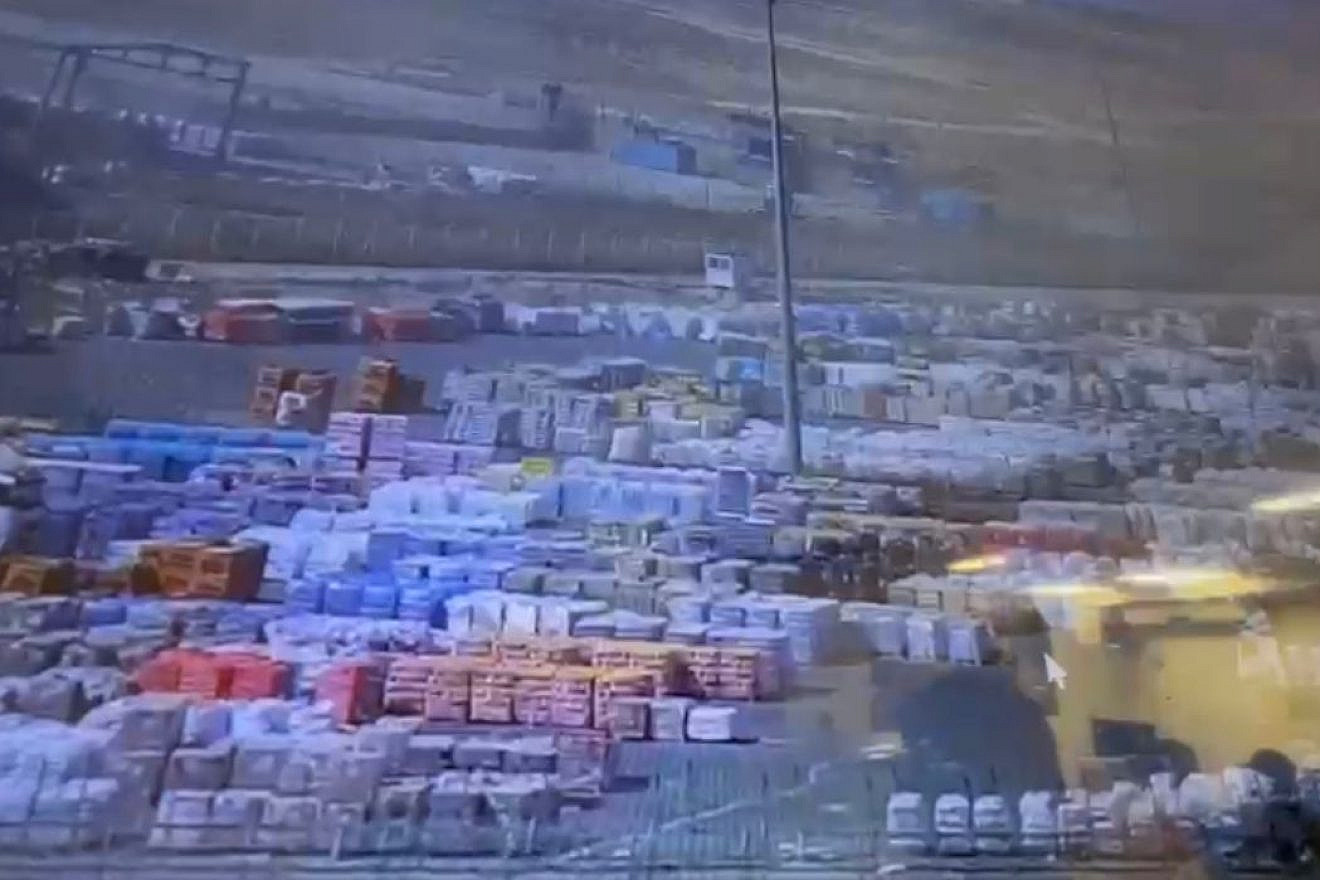
In short, the ICJ is casting blame solely on Israel despite the well-documented acts and failures of others, even as Israelis are killed while protecting aid crossings into Gaza.
ICJ Claim 3: “On the basis of the information before it, the Court is not convinced that the evacuation efforts and related measures that Israel affirms to have undertaken to enhance the security of civilians in the Gaza Strip, and in particular those recently displaced from the Rafah Governorate, are sufficient to alleviate the immense risk to which the Palestinian population is exposed as a result of the military offensive in Rafah…. On 6 May 2024, the United Nations Children’s Fund (UNICEF) indicated that about half of the approximately 1.2 million Palestinians sheltering in Rafah were children, and warned that military operations therein would result in ‘the few remaining basic services and infrastructure they need to survive being totally destroyed.’”
The Facts: The ICJ is, in short, denying reality. The court can only claim to be unconvinced that the Israeli efforts are not “sufficient to alleviate the immense risk” if it has completely ignored the fact that the IDF has already safely evacuated the vast majority of Gazans from Rafah. In fact, the IDF “moved somewhere between two-thirds to 80% of the Palestinian civilian population out of Rafah—with a minimal number of casualties—in under two weeks,” despite even “U.S. predictions that the civilian population could not be evacuated without a huge death count or without leaving around four months to do so.”
It is worth also pointing out the inadequacy of the ICJ’s hedging language about relying on “the basis of the information before it.” As noted in an earlier separate opinion by Barak, the ICJ has grounded many of its previous conclusions in this case on “several declarations by United Nations officials and reports by intergovernmental organizations that were not submitted by either Party.” That is, the ICJ has repeatedly relied on information not placed before it. Barak’s concern was, of course, that this meant that neither party had “the opportunity to comment on any of the evidence relied upon by the Court.”
ICJ Claim 4: “The Court observes, for instance, that according to a statement by the Commissioner-General of the United Nations Relief and Works Agency for Palestine Refugees in the Near East (UNRWA), Mr. Philippe Lazzarini, on 18 May 2024, ‘[t]he areas that people are fleeing to now do not have safe water supplies or sanitation facilities. Al-Mawasi—as one example—is a sandy 14 square kilometre agricultural land, where people are left out in the open with little to no buildings or roads. It lacks the minimal conditions to provide emergency humanitarian assistance in a safe and dignified manner.’”
The Facts: Set aside that Lazzarini plainly cannot be considered a reliable source of information. The quote the ICJ uses intentionally works to mislead on the reality of the humanitarian zones. It omits that the IDF dramatically expanded the humanitarian area, which now stretches from Al-Mawasi east all the way to Salah a-Din Road and all the way north to Deir al-Balah. It comprises an area many times larger than just a “sandy 14 square kilometer agricultural land” and includes built-up urban areas.
Neither the ICJ nor Lazzarini can claim they did not have access to this information, given that the IDF announced this expansion on May 6—12 days before Lazzarini’s statement and 18 days before the ICJ order.
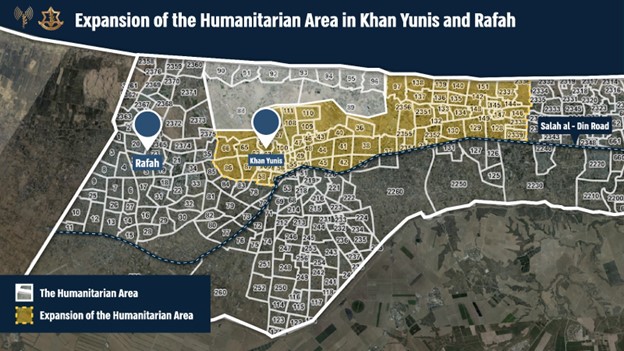
Even as of a month ago, the IDF had already facilitated the delivery of 53,400 tons of shelter equipment into the Gaza Strip, was developing “several dedicated shelter areas” in Al-Mawasi, and was working on additional plans for the entry of 44,800 more tents. The IDF has also more recently facilitated the expansion of field hospitals, and facilitated the increase in delivery of water, food and medical supplies to these humanitarian areas.
In truth, it has been organizations like Lazzarini’s—UNRWA—which have acted as barriers to the facilitation of these humanitarian zones, pledging to refuse an evacuation of the city after the IDF encouraged “international organizations working in the area…to temporarily evacuate prior to the beginning of the operation” for their own safety.
It is worth noting, in conclusion, that earlier this week, Shurat HaDin and other legal experts pointed out the coincidence of meetings between leaders of South Africa’s ruling ANC party and Iranian and Hamas officials, as well as a “sudden financial turnaround” for the formerly cash-strapped party in the immediate aftermath of its claims to the ICJ.
That the court would so easily fall for this shameful ploy, and in the process debase the very concept of international law, should prompt a reevaluation of the institution by all democratic countries.
Originally published by the Committee for Accuracy in Middle East Reporting and Analysis.




